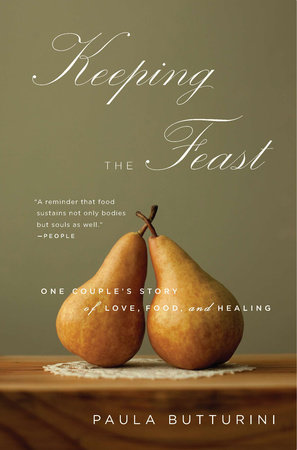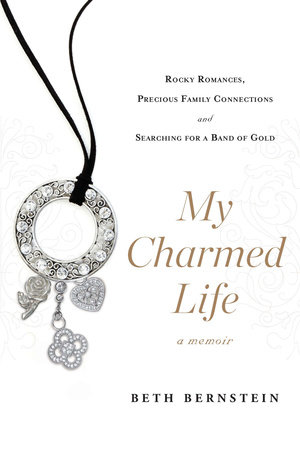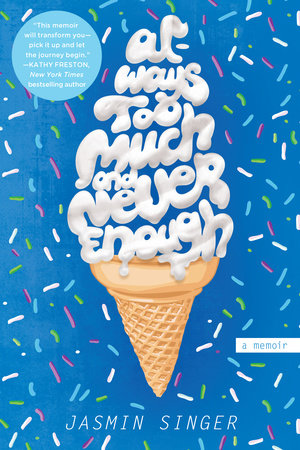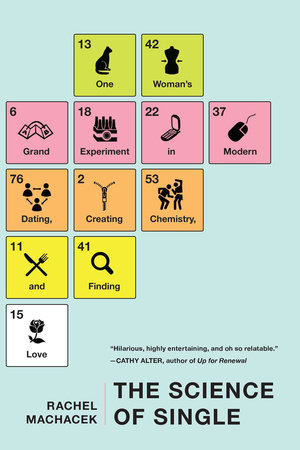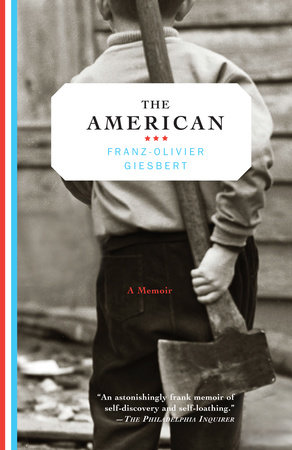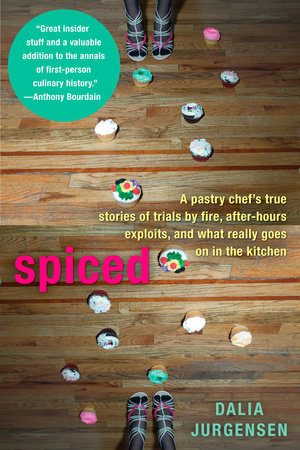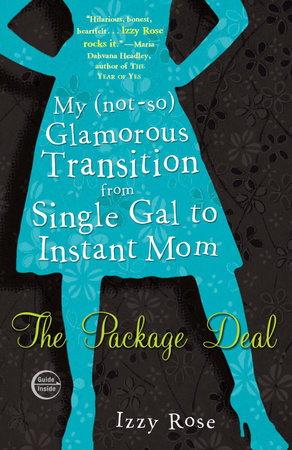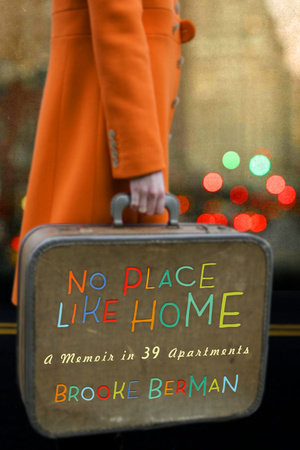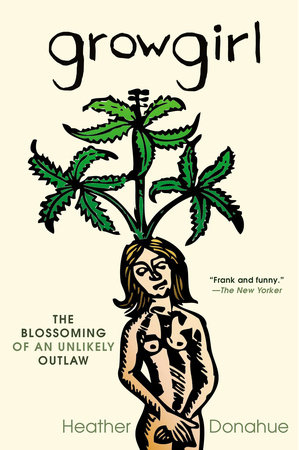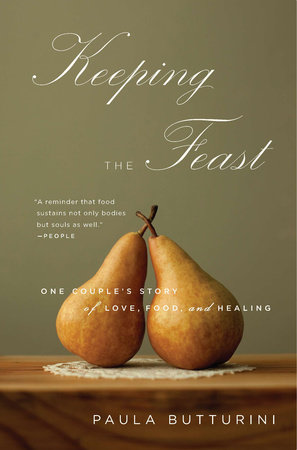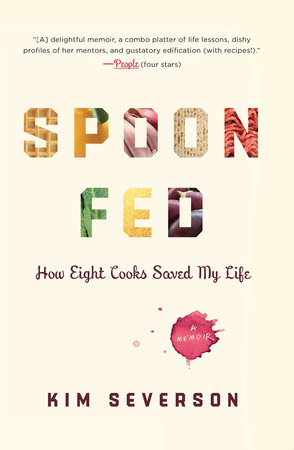Author Q&A
How did you and your husband, John, meet and fall in love?
John and I met in Rome in 1985 while both of us were working as foreign correspondents; John, for The New York Times, and I, for United Press International. When I think back on it, I think it’s fair to say we fell in love over what seems like an endless series of late dinners at simple outdoor Roman restaurants, mostly the kind with rickety tables wobbling on the cobblestones and covered with butcher paper instead of tablecloths. Eating together night after night, with good friends, good food and endless chatter, made both of us feel at home, and comfortable with each other — as if we actually were at home with our respective families. Before we knew it, John and I felt like family, and then we were; once we were together, it felt right to accept our new reporting jobs in Poland, leaving Rome and all its happy memories behind.
In 1992, John fell into a deep clinical depression that lasted for years. What events led up to this period of depression?
Here’s the abridged, shorthand version of what led to John’s collapse: a beating (mine); a near-fatal shooting (his): seven operations, months of treatment and rehabilitation, hepatitis B (all his); an unexpected death (my mother’s); a cancer diagnosis (my father’s); the return of a childhood illness (my brother’s); and the final straw, an impending move back to America (ours) after John had been in Europe for more than a quarter century. From late 1989 until 1992, we suffered a string of troubles that read like a chapter out of Job. Neither of us had ever been injured on the job in all our years as reporters, but as Communism started to topple in Eastern Europe in 1989, we took a one-two punch that left us both reeling. In mid-November, 1989, I was beaten unconscious in Prague by Czechoslovak police at the start of the so-called “Velvet Revolution.” Five weeks later, John was shot and nearly killed by a sniper in Timisoara, Romania, during the bitter fighting there to overthrow the country’s Communist regime. The timing couldn’t have been much worse: two days before Christmas and twenty-three days after our long-planned wedding in Rome. John was too seriously injured to be moved by ambulance out of Romania, where hospitals did not even possess modern antibiotics, and it took six days to get us airlifted to Munich, where doctors had to fight to save his life. About four months after the shooting, just when he was starting to feel nearly human again, he got hit with a case of hepatitis B, caused by bad blood transfused during one of his last operations. John’s hepatitis was so serious that his doctor raised the possibility of a liver transplant, and it took John the better part of a year to recover. Another set of revolutions that John covered, these in the former Yugoslavia, kick started flashbacks to his shooting in Romania, and after my mother died, and my father and brother became ill, John ever so slowly began closing down within. Just as he was about to start a new posting in Chicago in the spring of 1992, he suffered a full-fledged collapse.
At the same time that John began to descend into depression, your mother—who had finally revealed to you in your late twenties that she had suffered from severe bouts of post-partum psychosis when you were a child—relapsed into a severe depression and took her own life. How did dealing with your mother’s depression and suicide inform the way you dealt with John’s condition? How, in turn, did dealing with John’s depression help you to further process and understand what your mother had been through?
The return of my mother’s depression at the same time that John, himself, began to descend into depression at first seemed one of those unimaginable cruelties that one reads about only in bad novels. My mother was seventy-three when her depression returned, about three decades after she suffered four very serious episodes of postpartum psychosis: the first when I was born; the last, just after the birth of my brother when I was seven. To this day I have no memories of her illness when I was a child. Still, even though it was the Fifties, when nobody spoke about depression, I always knew my mother wasn’t like my friends’ mothers. She was far more nervous, frightened, quick-tempered, and easily derailed. While the return of her illness — and its timing — seemed damnably unfair, I see now that both served, in the long run, to help John get over his depression. Having just lost my mother to depression, I was bound and determined that I was going to do anything and everything possible so that I wouldn’t lose my husband as well. And I was even more determined that I would never try to keep John’s illness a secret, especially from the children. My own childhood was very puzzling to me precisely because of the secrecy surrounding my mother’s illness. I felt strongly that the best way to fight this illness was to talk about it, make it public — within and without the family — to make it better understood, because when it strikes, it is often so very crippling and terrifying that only knowledge and a great deal of help from other people — family, friends, neighbors, as well as doctors and therapists — can help bring it under control. I felt very strongly about another aspect of the illness: that when one family member suffers from it, the entire family suffers as well. So if the family hides it, lies low, tells no one, or pretends everything is all right, then everyone is going to suffer longer and harder.
As to the second question, watching John struggle, literally for years, to get back on track after his collapse made me realize the absolute heroism of anyone who is in the throes of serious depression. I only understood how difficult my mother’s life must have been, and how hard she must have fought, during that series of four depressions she suffered in the 1950s after living through the same thing with my husband. Her suicide nearly derailed us all, at first, but the sorrow, pain, anger, disbelief and utter grief our family experienced in its aftermath, has, for me at least, melted away over the years. Nearly twenty years after her death, I am in awe of her strength and perseverance in fighting off depression’s demons for so long; I would not have seen that strength and perseverance had I not lived through the same illness with John. The sadness I still feel over her death will never leave, but, I know her own illness has helped save John’s life. I hope her story may help other families going through the same hell.
How did your dealings with John’s sickness help you to further understand your father, as someone that, like you, had to deal with the reverberating effects of living with and loving a person battling depression? What advice did your father ultimately give you to help you to get through this difficult time?
My father and I have always been especially close, but dealing with my mother’s illness and death, and then with the same illness in John, brought us even closer. Although I was born into a family that suffered from depression, both my father and I ultimately married into depression, and whenever he offered advice, I never had any doubt that he understood in the most fundamentally profound way what John and I were going through, since he and my mother had been there too. My father is 91 now, and by nature an upbeat, positive-thinking person who still lives on his own in the house where I grew up, who still takes care of himself, shops, drives, cooks, and who credits his health to a lifetime of good, healthy food and near-daily walks along Long Island Sound. The soundest advice he ever gave me was to remind me not to blame John for our troubles. “Remember, Paula, it’s not John – it’s the illness,” he would say over the phone week after week, month after month, year after year, when John was so ill and I was at wit’s end. He was the one who gave me the strength to keep going, the one who reminded me unfailingly that no matter how deep and long a depression can be, it ultimately will pass if the sufferer can just hold on long enough.
You state in the book that the period of John’s depression was more terrifying for you than when John was lying in a hospital in Romania, or when he was unconscious and nearly dead in the intensive care unit in Munich. Why was his depression more frightening?
There is no question that John’s depression was far more terrifying to me than when he was lying in a hopelessly ill-equipped hospital in Romania, or when he was nearly dead from septicemia in an intensive care unit at one of Germany’s top clinics. In both hospitals, he was a very recent casualty, and though his condition was critical, the body lying in those hospital beds in Timisoara and Munich, was clearly John, the man I had just married a few weeks earlier. He may have looked ghastly, gray and skeletal, he may have been near death, he may have had a trench wound across his back as long and deep as my forearm, but he was still the man I knew and loved and had just pledged to stick with “until death do us part.” Had he died of his wounds in hospital, I would have been mourning John, the man I knew and loved. John’s depression was far more frightening because the man I knew and loved was simply not there. For a period of months and years, when John was sinking into the depression, then suffering horribly from it and finally very, very slowly trying to pull out of it, the John I knew and loved had disappeared. His body remained, the shell of the man, but his essence was gone, and in its place was a total stranger, a total stranger who was the antithesis of the man I had married, a terrified and terrifying ghost who seemed to have nothing in common with my John, other than a vague physical resemblance. Had John died during his depression, I would have been mourning another person, the memory of someone who was already long gone.
What spurred you and John’s decision to return to Rome after the onset of his depression, where you would end up staying for the next seven years?
It was John’s idea to return to Italy. But both of us thought we were just going ahead with our usual summer plans, a long-planned, three-week vacation with his two children, at a simple house in the country on a pristine lake an hour north of Rome. We’d been going there for several years, and all four of us adored it. John thought that keeping our plans intact and going back to a place he loved, might brake his depression or at least keep him stable. Returning to the lake house actually did make him feel a bit better, as did spending time with the children and many of our dearest friends from Rome. It was only as our vacation neared its end, that John suddenly dug in his heels and announced that there was simply no way he could leave. He was adamant that he felt better where he was and said he feared he would go off the edge if he returned to the States, where he was supposed to start a new assignment for The New York Times in Chicago. John’s editor at the Times could not have been more helpful. His editor stressed that John’s job at that point was not to try to work as a reporter, but as a patient trying his best to heal. We spent the rest of the summer at the lake, and in the fall moved to a small, furnished apartment in Rome where John had access to a great English-speaking psychiatrist. We stayed on in Rome for about seven years, largely because we were happy to be back in a place we both loved, in the city where we had met and married, in a city where we had managed to carve out a life again that brought John some peace. It didn’t hurt that Rome, with all its history, art, archaeology, architecture, and music, provided endless nourishment for our souls, as well as endless — and delicious – nourishment for our stomachs.
What role did the buying, preparing, and eating of food have in helping both you and John to survive this period?
When John’s depression was at its worst, it would be an understatement to say that I was distressed enough to not be sleeping very well. I was waking up very early each morning, and John, with all the medications he was taking then, would always sleep at least a couple of hours later than I would. At the time we were living only a few minutes’ walk from one of the best outdoor markets in Rome, the Campo dei Fiori. As I didn’t like to leave John alone in the apartment much back then, I started doing our food shopping early, to get me out of the house on my own for a bit, but at a time when he was asleep, so I wouldn’t have to worry about him. Buying the food we would eat that day was all about me — not about John or his illness — and it was, generally speaking, the only thing I did all day where I could put my worries about John away and enjoy a bit of normality. I got to know many of the fruit and vegetable sellers over the course of that year, and it was my way of starting the day in a relaxed sort of way: looking at all the produce that was on sale, then choosing whatever looked best, whatever I felt like preparing and eating. Preparing our three meals was mainly about me too because each time I started washing, chopping and cooking vegetables, each time I sat down to decide what we would eat and how I would cook it, I was making time pass, I was doing something positive, something I have always truly enjoyed, and I was heading off having time on my hands, which is when I would generally just worry endlessly about what was going to happen to us if John didn’t get better soon. Unlike the buying and the preparing, the eating of the food was not just about me, but about both John and me, as a couple, as a family, as two hungry people who needed to be fed. Both of us had grown up eating all our meals with our whole family, and sitting around our little dining table together — even when John was basically too ill to talk — was still a comfort that reminded us of happier days.
You say in the book that your morning trip to the Campo dei Fiori—a vibrant outdoor market in Rome—became an important daily ritual for you, at a time when John’s depression was at its worst. What did this ritual consist of? How did a simple daily trip to the market become so vital to you?
The ritual consisted of getting up and dressed early, and walking over to the Campo while John and most of Rome were still asleep. It was a short walk, maybe three or four minutes long, but an extraordinarily beautiful one, on narrow cobblestoned streets and across one of the city’s most magnificent squares, the Piazza Farnese. In the quiet of early morning, Rome is just about perfect, and my simple daily trip to the market soon became my favorite moment of the day, not only because of the beauty of it all, but because it was one of the few moments of the day that I succeeded in shutting down the constant worries in my head about John, and simply enjoyed myself. That daily morning outing was the one time of the day I managed not to worry about John or any of our problems at all; if I thought about John at all during my morning shopping trip, it was in the most normal of ways, idly wondering whether he and I might prefer melon or a few perfect, fat purple figs to go with our prosciutto crudo at lunch. The rest of my day was so stressful and worrying that my morning trip to the Campo was like an hour of yoga or a long, relaxing walk on the beach — utter unthinking pleasure, a balm.
Another part of your morning ritual was to stop at the little church on the way home from the Campo. What would you do there? Why was this part of the ritual important?
I would stop at the little church of Santa Brigida, which is one of the few smallish buildings in the Piazza Farnese. Unlike many Roman churches, which are often locked up tight, Santa Brigida seemed to be open nearly all hours of the day. I think I first stopped in on my way home from the Campo one day because I simply wasn’t ready to go back to the worries that always beset me the moment I walked into our little flat. But it may also have been that I heard the nuns singing as I walked by. I really don’t remember. When I first started to go there, I can’t say I was praying, at least not with words. I’d just listen to the chanting, or stare at a painting of the Madonna that hung on the side of the church, or, just kneel in the soft light that came in and try to hang on. On really bad mornings, I might find myself, before I knew it, with tears streaming down my cheeks. And I’d stay there, just kneeling, tears rolling, nothing more, until I managed to collect myself. Months later, when John was still terribly ill, and I was getting more and more fed up with everything, the tears would start in and before I knew it, I would find myself pounding on the back of the pew in front of me, angry, fed up, frustrated, unable to do anything else. It was totally bizarre, and not at all my usual sort of public behavior. I was horrified when it first happened, but as time went on I guess I realized I felt safe in that place and able to respond to my predicament in ways that I felt I couldn’t when I was with John.
What role did food play in your family life growing up? How has this informed your relationship to cooking and eating as an adult?
Food played an enormous role in my family life when I was growing up. I expect some of it was simply human — after all, everybody’s got to eat if they want to live — and I would guess that some of it was cultural — my grandparents were Italian and must have missed the old country, and though they lived the rest of their lives in America, they always cooked and ate Italian food until they died. But a lot of it, I think, just came from the fact that we all liked to eat. But eating wasn’t the only thing we liked about food. Both sets of my grandparents had vegetable gardens, and all of us liked to cook, although it was my father who had to teach my mother how, when they were first married. Food meant a million things to us: nourishment, of course, but also comfort and camaraderie; it gave us a sense, I think, of being home and safe, of being well loved, of belonging, of tradition; it reminded us of our past and built us up for our future.
As an adult, I don’t cook only Italian food, but I still cook a lot of it, and after living in England, Spain, Italy, Poland, Germany and France, I still get the most comfort out of food that belongs to the Mediterranean diet. We don’t eat much butter or cream, we eat almost nothing fried, and our fruit and vegetable intake is a lot higher than our meat ration. Breakfast remains one of my favorite meals of the day, and even after a decade in Paris, I’m not a fan of the stereotypical French breakfast — coffee and croissant. I’d much rather have yogurt with fruit, or an egg, or oatmeal to start the day.
You describe in the book how, nearly a year after the onset of John’s depression, your patience for his condition began to wane, replaced by anger. How was this shift in your attitude and approach actually helpful, do you think, in moving John in the direction of recovery?
I think the anger I began to feel, and only much later began to express to John, served as a wake-up call to him at that point. After months and months of treatment, at least three to four sessions of psychotherapy a week, John seemed less agitated, less terrified and less caught up in the black hole of depression, but his day-to-day behavior hadn’t really changed all that much, vis-à-vis me. He was still mostly silent, still very much wrapped up in his own thoughts and worries, still easily spooked by anything from the outside world — a phone call or the ring of our doorbell. I think my anger was my way of daring and demanding him to start showing me signs that he was trying very hard to get back to normal, and that my patience was not going to last forever. My anger was all mine: it was something that was growing and that I needed to let him know about. But the idea of demanding John to start showing me signs of improvement was his doctor’s idea. The doctor made it clear that my large reserve of patience was, while useful at the beginning, was no longer doing John — or me — any favors. It was the doctor who made me understand that having no demands at all was not a good thing for either of us.
What first compelled you to want to write a book about the psychological aftermath of your husband’s shooting?
From the time I was born until I turned eight, I had grown up in a house with a depressed parent. In keeping with the secrecy of those times, however, not only was my mother’s sickness never discussed, I never even knew she was ill. When she finally told me about her illness, when I was in my late 20s, her revelation was like a key to the great puzzle of my childhood. Things suddenly fell into place and made sense. I felt strongly at the time, and only more strongly now, that children are extremely bright and aware and need to know what’s going on within their family, need to be able to understand it and talk about it. John’s two older children were 14 and 8 when he was shot, and both of us saw how ripped apart they were by his injury, even if they themselves might not have been able to express it at the time. After John tumbled into depression, I really wanted them to understand what was happening, so they would not be as confused and lost and puzzled as I had been when my mother was ill. When I first sat down to write the book, I was writing it primarily for the four of us, John, Peter, Anna and me. I especially wanted the children to have access to everything that had happened to us at the time of the shooting and in all its aftermath, so that they would never be at a loss to understand their childhood. Depression often runs in families, and although no one seems to know how much of it is genetic, and how much of it is not, I wanted to give Peter and Anna — and later Julia too, once she was born — all the information they might ever want on the confusion and chaos that reigned so long after their father was shot.
Shortly after John’s recovery, you decided to try to have a child together, and in 1997 your daughter Julia was born. How did John react to Julia’s birth? How has Julia come to understand her father’s illness and how to handle it?
John’s initial reaction to Julia’s birth was wonderful. That first week, when his older daughter, Anna, came to spend her spring vacation with us and see Julia just after she was born, father and older daughter got to spend a couple of weeks together while Julia and I were still in the hospital. But Anna’s departure coincided with Julia’s and my release from the hospital, and John went into a panic when we first got home. I wish I had known he’d had similar reactions when Anna and Peter were born too. But his doctor was quick off the mark, and came to our house that first night, and spent time talking with both John and me. He gave John something to help him sleep, and while he was somewhat panicked for a few weeks, he soon got over it, and fell for Julia the same way he had fallen for Peter and Anna when they were born. Julia came to understand her father’s illness when she was nearly seven; John suffered a major relapse that year, and Julia saw her father turn from the happy, cheerful daddy she knew – the one who played with her and told her jokes and sang her silly songs – to a stranger who didn’t play or tell jokes or sing any longer, who simply came home and slept or tried to sleep, or who sat in his favorite chair, trying not to cry. A short time after John became ill, I began consulting a family therapist for help in how to explain it all to a child Julia’s age. This psychologist was a life-saver in helping me come up with a description of her daddy’s illness, in words we could understand, and what we could do to help him feel better soon. I’d say I realized Julia came to handle the situation when she was nine. It was then that she was able to voice her own concerns about depression in her own words, ask what it might mean for her future as well as his, and tell me, in a very direct way, what depression meant. I feel that all three children have a much better handle on the entire problem – as it concerns their father and as it could one day concern them – because we’ve talked about it all so much during the last years.
Has John’s depression ever resurfaced in recent years? If so, how did you deal with it?
John’s depression resurfaced 15 years after his shooting. Both John and I were far more aware of what was happening this time, and we moved far more quickly than we might have had he not been so sick earlier. Having a six-year-old child at home with us then pushed me to push him to real action sooner rather than later — I didn’t want our daughter traumatized for a long period by the fallout from his illness. John had already restarted talk therapy before the depression took firm hold, and then, when it was clear that his depression, like his earlier one two years after the shooting, was not responding at all to drug therapy, we took our doctors’ advice in France and he underwent electroconvulsive therapy, the modern version of shock treatments. They worked remarkably quickly, in less than a month. For people with drug-resistant depression, electroconvulsive therapy is an alternative to consider. If John suffers a relapse any time in the future, we wouldn’t hesitate to seek out electroconvulsive therapy immediately.
What advice would you give to others dealing with a close family member or friend with depression? What common misconceptions about the illness and how it’s treated do you wish to dispel? What do you know now that you wish you had known then?
I’m not a doctor but I know what worked and what didn’t work for my family. I think the most important thing is to get the affected person into treatment immediately with a recognized and trained person in the field. That’s the most basic demand a spouse can make, and one that is crucial not only for the sufferer but for the entire family. The next thing I would do is get the rest of the family in for some kind of help as well, perhaps with a family therapist, so that the children as well as the spouse of the sufferer can begin to understand what’s going on and what’s likely to happen. It might be just one or two meetings for the children, depending on how they are reacting to the illness; I personally found a weekly meeting useful for months, to help me get through the situation on my own account, and to learn how I might be able to help John. Our daughter, seven at the time, saw the same therapist only once; it was at my insistence, so I could stop worrying about whether she needed help. The therapist assured me she didn’t need help after that one meeting, but she did need repeated, constant reassurance from me about the course of her father’s illness. My doctor gave me the words to use to explain depression to a child of that age, and they were invaluable. I began to repeat them to her, almost like a bedtime story. And the explanation truly and noticeably helped her.
I think one of the most common misconceptions about the illness is that sufferers are somehow just weak individuals, looking for sympathy or pity, who can’t just pull up their socks and get on with their life. Major depression is an illness, a very serious, recognized medical illness that takes thousands of lives each year. Just as cancer, heart disease, and strokes are illnesses, depression needs to be treated, not just gotten through on one’s own. Talk therapy with trained psychiatrists and psychologists, anti-depressants and electroconvulsive therapy are some of the standard treatments that can help. Much as I loved Ken Kesey’s book, One Flew Over the Cuckoo’s Nest, and the Jack Nicholson film based on the book, both had an enormously negative affect on shock treatments, which were portrayed as punishment for bad behavior rather than an alternative cure. For the many people who don’t respond to drug therapy, electroconvulsive therapy can be an incredibly effective alternative. Another common misconception about depression, I think, is that it must be kept hidden at all costs. I personally feel that trying to keep things hidden just means that you don’t talk about it, but everybody knows about it anyway, though no one would dream of discussing it with you, since they’re not supposed to know. Children, especially, should be told about the depression of a parent: even at a very young age, they notice far more than we might think they do, and if we don’t explain the situation to them in simple terms they can understand — and remind them it is not their fault — we are doing them a terrible disservice. I wish my family and I had been aware of depression’s recognized symptoms a lot earlier. I don’t know if lists of symptoms were available back in the 50s, but they are certainly readily available today, and if a family member has been suffering from several of these symptoms for more than two weeks, doctors generally say that professional help is needed. Brochures listing the symptoms are usually available in doctors’ offices, in clinics, or in hospitals and on the Internet; search for “symptoms of major depression”.
